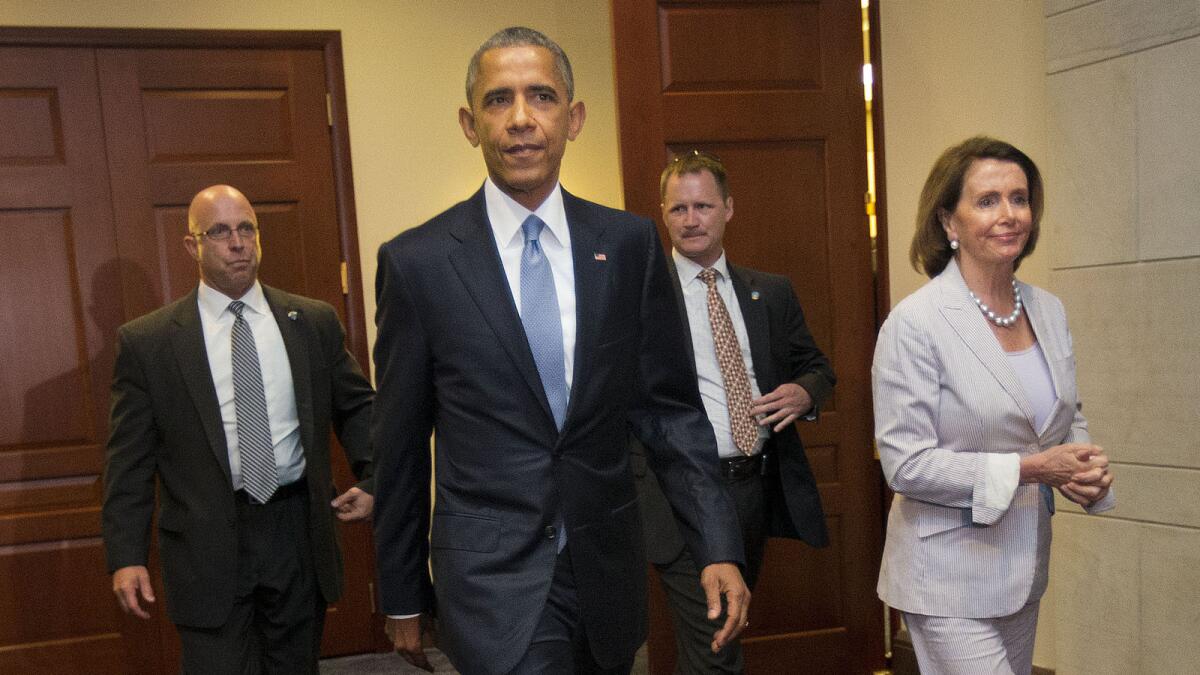Path forward uncertain as trade measure stalls in Congress

President Barack Obama walks with House Minority Leader Nancy Pelosi of Calif., after meeting with House Democrats on Capitol Hill in Washington.
Days after President Obama’s trade agenda was scuttled by members of his own party, the White House and congressional Republicans have found no clear path forward, raising doubts about what was supposed to be one of the administration’s final legislative accomplishments.
Republican leaders vowed Monday to press ahead in their rare alliance with the Obama administration against Democratic leaders and organized labor over a trade measure that the White House says is crucial to securing an ambitious 12-nation Pacific Rim pact known as the Trans-Pacific Partnership.
But in a sign of the challenges still ahead, tentative plans to vote again Tuesday on the defeated portion of the House package appeared to be shelved. GOP leaders agreed instead to extend a procedural deadline to vote until July 30.
“We’ve got to get this done one way or another,” said House Majority Leader Kevin McCarthy (R-Bakersfield). “The best option right now [is for] Democrats to come to their senses.”
McCarthy warned that chances of passage will only diminish with time. “The longer something like this sits out there, the harder it is to bring it back.”
At the White House on Monday, Press Secretary Josh Earnest continued to describe the setback as a “snafu,” and administration officials worked back channels to shore up support. Obama called House Speaker John A. Boehner (R-Ohio) to discuss strategy.
But no Plan B emerged, and Obama’s pursuit of the trade package increasingly isolated him from other Democratic leaders, who worry the Pacific Rim trade deal would hurt American workers.
Minority Leader Nancy Pelosi (D-San Francisco) defied the White House last week and sided with those in her party who want more protections for labor and the environment as part of the final deal. Pelosi fielded a call Monday from White House Chief of Staff Denis McDonough, but no consensus was reached and Democrats showed no signs of backing down.
In another blow, Hillary Rodham Clinton, the party’s 2016 presidential front-runner, distanced herself from the trade deal in comments over the weekend and again on Monday.
“The issue for me is what is in the deal,” Clinton said in New Hampshire. “We need a better deal.”
Specifically, Clinton raised questions about a so-called Investor State Dispute Settlement process created under the accord. Critics have dismissed it as a “secret” tribunal that would benefit mostly big corporations. Clinton called it “an anti-Democratic process.”
The former secretary of State’s views on trade have varied over the years. In 2012, she said the emerging TPP deal would set the “gold standard” for open, free trade, but she has since taken a more nuanced position.
“There’s always room to maneuver, and I think this is one of those times,” she said, urging Obama to use the legislative setback as leverage with Pacific nations to demand better terms for American workers.
Other than the annual congressional picnic at the White House planned for Wednesday, there was little evidence the president was conducting fresh outreach to bring lawmakers from either party on board.
Administration officials were actively reaching out to thank Democrats who voted to advance the trade package for sticking with them. The AFL-CIO was doing the same, running ads of support for those who voted against.
The fast-track legislation is a precursor to the broader Trans-Pacific Partnership trade pact that has been years in the making. Like other fast-track bills sought by previous presidents, it would enable the administration to promise its negotiating partners that the eventual trade pact would receive a simple yes-or-no vote in Congress without amendment.
The House and Senate both approved the fast-track legislation, but the House rejected a companion measure that had passed the Senate, stalling fast-track. The Trade Adjustment Assistance measure would preserve a training program for American workers who lose their jobs to overseas trade.
Supporters of the fast-track legislation are searching for procedural alternatives to win final passage.
One strategy would be for the House to try again to pass the training-assistance package. Democrats traditionally have supported the worker-training program, but voted against it last week because they said it was the only way to doom the broader fast-track package and slow TPP negotiations.
The worker program is set to expire Sept. 30. It was unclear Monday whether enough Democrats would switch votes to extend it.
Alternatively, House Republican leaders could ask their members to pass the retraining program without Democratic help, since the GOP holds the majority. But most Republicans reject the assistance program as wasteful government spending.
A third option would be for Republicans to try to pass the fast-track bill again in both the House and Senate, but without the worker training program.
That strategy risks losing needed votes from Democrats, who want guarantees that the retraining program will continue. The fast-track bill only narrowly overcame a procedural hurdle in the Senate. The House vote also was close.
Administration officials would not say Monday whether the president would agree to a fast-track bill without the training-assistance program.
“The reality is, this is one of those monsters that if you poke it on one side, it comes out the other,” said Thea Lee, the deputy chief of staff for the AFL-CIO. “It’s hard to see where the path to victory is.”
Times staff writer Evan Halper in New Hampshire contributed to this report.
For the latest from Congress and the 2016 campaign trail follow @LisaMascaro
More to Read
Start your day right
Sign up for Essential California for news, features and recommendations from the L.A. Times and beyond in your inbox six days a week.
You may occasionally receive promotional content from the Los Angeles Times.








